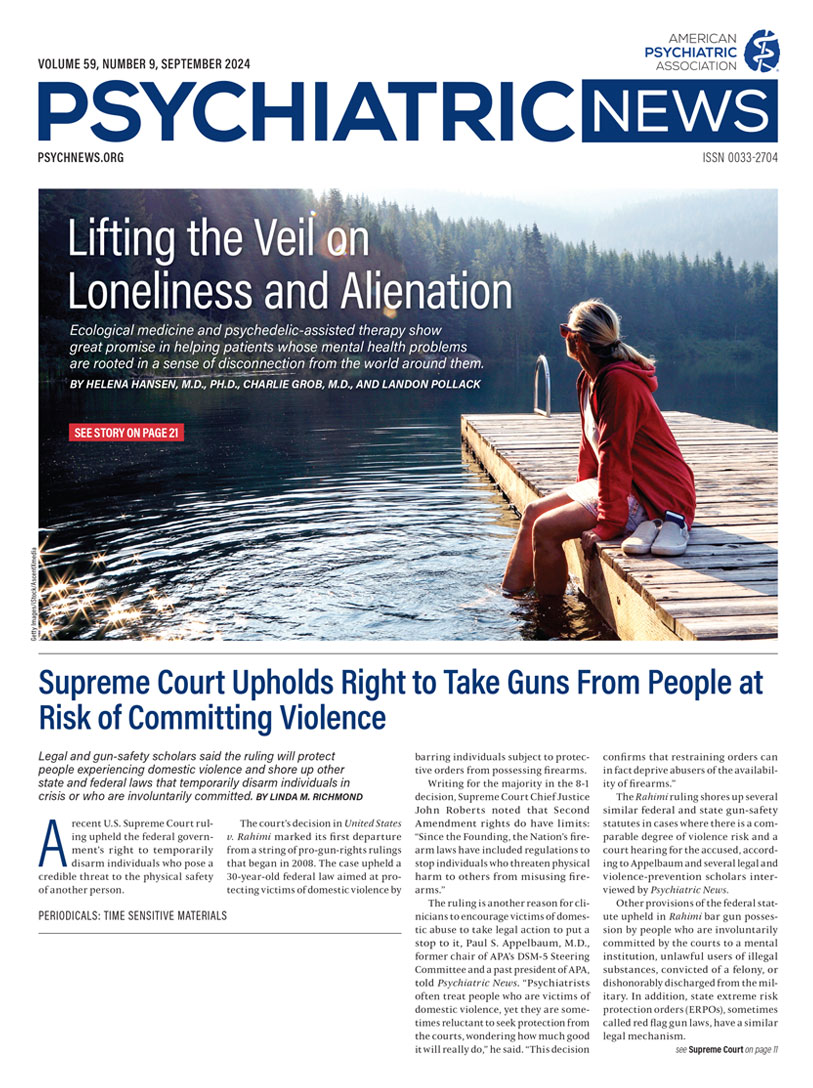This is an important issue that deserves further investigation. Were these patients abused by researchers or by therapists? How frequently did sexual abuse happen? Did it occur in more than one trial?
I believe that this raises serious ethical concerns about the conduct of psychedelic trials and whether data from trials in which subjects were sexually abused should be used. In addition to the violation of research subjects’ rights, issues such as this seriously undermine public credibility in research studies, our field, and, more broadly, in all of medicine.
It appears that research subjects’ human rights might have been violated in these trials, and this issue must be vigorously addressed. The American Psychiatric Association frequently raises concerns about various human rights abuses. I challenge APA and Psychiatric News to conduct a debate by leading ethicists about this issue and address my question of whether the data from these trials should be used. ■
RICHARD BALON, M.D.
Response to Dr. Balon:
In his thoughtful letter, Dr. Balon calls for debate among ethicists about whether data from psychedelic research trials in which subjects who were allegedly sexually abused should be used.
Concern about heightened risk for sexual abuse in the context of treatment with psychedelic agents is expressed in the resource document written in 2022 by the APA Ethics Committee, which states: “Under the influence of psilocybin or MDMA, patients may become more suggestible and easier to manipulate. Patients may experience intense attachment and transference, including of a sexual nature. For these reasons, clinicians working with these substances must carefully uphold boundaries.”
Dr. Balon points to allegations of sexual abuse in the MDMA-assisted psychotherapy for PTSD trials conducted by Lykos Therapeutics (formerly MAPS Public Benefit Corporation), which are under review by the FDA. The FDA’s Psychopharmacologic Drugs Advisory Committee recommended on June 4 against approval. The Institute for Clinical and Economic Review (ICER) concluded the month prior as well as in a final report in June that the research evidence was insufficient to endorse MDMA-assisted psychotherapy for PTSD.
With respect to the incidence of sexual abuse in the MDMA trials, the ICER review concludes, based on public reports, that “sexual boundaries were severely crossed with at least one patient in a Phase II trial.” To my knowledge, sexual boundary violations described by the participant in the Phase II trial in Canada have not been reported by other participants in that or other Phase II or Phase III trials. Concerns about this serious occurrence as well as other potential methodological and ethical problems, however, have been reported to Health Canada (Canada’s equivalent of the FDA), the FDA, and the U.S. Department of Health and Human Services (HHS). Although these regulatory bodies did not shutter the studies, the details of their investigations have not been shared publicly.
Sexual misconduct should not be tolerated in any clinical care or research environment, and if it occurs, the perpetrators should face severe consequences for this violation of ethics and trust. However, decisions about discarding clinical trials data based on methodological or ethical violations need to evaluate the extent to which violations may have critically undermined the integrity of the research overall. They also need to consider the ramifications of discarding data for the hundreds of study participants who incurred inconvenience and risk to advance knowledge as well as the potential of delaying the development of new treatments for disabling and life-threatening conditions.
This important area of research deserves to have any ethical and safety concerns openly debated and addressed. Additional disclosure of information from the investigations of the MDMA trials by Health Canada, the FDA, and HHS would likely help clarify the nature and extent of purported violations and enable stakeholders, bioethicists, and the public to evaluate the integrity of these trials. ■
JONATHAN E. ALPERT, M.D., PH.D.
Chair, Council on Research
American Psychiatric Association
Chair, Department of Psychiatry and Behavioral Sciences
Montefiore Medical Center and Albert Einstein College of Medicine
